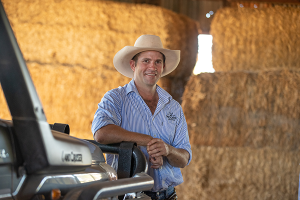The weather event killed thousands of livestock, devastated the livelihoods of rural families and their communities but as the flood waters receded, graziers got to work straight away, clearing debris and dead livestock, fixing fences, replacing damaged equipment and starting the long road to recovery.
Cloncurry grazier Donald Moore was among them.
Mr Moore estimates as much as 20% of his herd, which was otherwise healthy and strong, died – but like other graziers in the area, his herd didn’t drown.
“Our biggest impact wasn’t being under water, it was the exposure that killed a lot of our cattle. Through the constant cold and wet, with the lead up of days of 40C temperatures, hyperthermia is mainly what killed them, they died from exposure,” he said.
“I thought we would be safe but it wasn’t until the last few days of the flooding event where I started to hear neighbours were losing cattle. I got in a chopper as soon as I could and I could see them same story; they were in the North West corners trying to get away from the wind and the rain. That’s where they all succumbed to the cold weather.”
Mr Moore was quick to access the $75,000 Special Disaster Assistance Recovery Grants (SDARG) administered through Queensland Rural and Industry Development Authority (QRIDA) to help pay some of the costs associated with the clean-up and recovery process and later a Disaster Assistance Loan to help restock.
More than $75 million in Special Disaster Assistance Recovery Grants funded through the Queensland and Australian Government have been paid to primary producers, small business and non-profits across the disaster declared areas as at June 2019.
“The grant and the disaster loan really helped us because we were carrying a lot of debt, we had to service that debt and had repayments coming up just after the flood event hit,” Mr Moore said.
“It took a lot of pressure off us and it was one less thing to worry about when we had fences to fix and cattle to look after.
“If it wasn’t for the grant, instead of being able to go out and buy cattle, we would have had to breed our numbers back up which could have taken five years.”
Mr Moore was already aware of QRIDA services and the Regional Area Manager in Cloncurry, having accessed a First Start Loan to purchase 500 head of cattle in 2018. Many of those were lost in the weather event.
“I was very impressed with how quickly the grants rolled out and how easy it was. That was a big relief. I thought it was a really good initiative, with the flow on effects to the guys who couldn’t get work, I could pay them and buy fencing supplies in town so we were helping those businesses,” he said.
QRIDA also administer the $400,000 North Queensland Restocking, Replanting and On-farm Infrastructure grant on behalf of the Australian Government. Eligible primary producers can apply for this next tranche of financial assistance after they have utilised the $75,000 disaster grant.
“That’s the beauty of having a few years to do it all, we can put a plan together and get the right cattle. When the right cattle come along we will be ready to jump on it,” Mr Moore said.
To find out what disaster assistance is currently available visit our Disaster Recovery for primary producers page.
QRIDA administers financial assistance to disaster affected primary producers, businesses and non-profit organisations under the joint Commonwealth / Queensland Government funded Disaster Recovery Funding Arrangements 2018.
The North Queensland Restocking, Replanting & On-farm Infrastructure Grants are funded by the Australian Government and administered by QRIDA.
